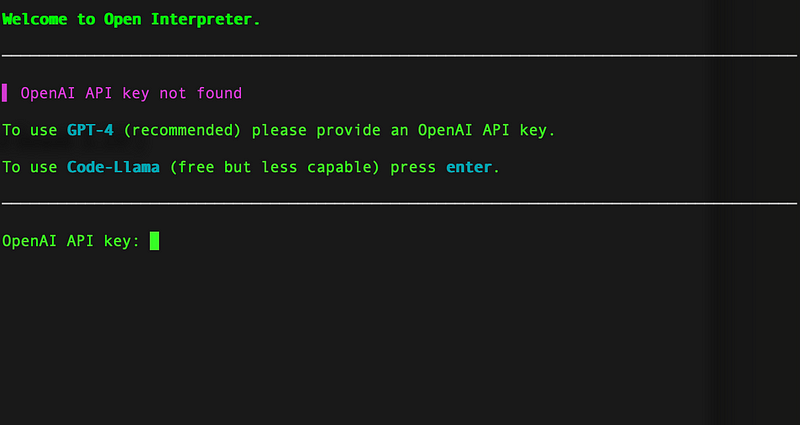Unlocking AI Code Execution on Your Local Machine
Written on
The Programmer's New Best Friend
In today’s world, being a programmer is incredibly exciting. Whether you're a freelancer or a solopreneur, it often feels like you have a robust team at your fingertips—think ChatGPT, GitHub Copilot, and even Stack Overflow, which has recently embraced AI to enhance its community. The days of coding in isolation are over.
Where to Discover Innovative AI Tools
So, where can you find the latest and greatest AI tools? Platforms like ProductHunt and AppSumo are filled with fantastic, often freemium applications, but the true innovation landscape is thriving on GitHub. Here, developers generously share their code and ideas, and while having some technical skills can be beneficial, it’s not strictly necessary. The reward? Access to remarkable AI resources at no cost, making it absolutely worthwhile!
Introducing Open Interpreter
Open Interpreter is an open-source tool that allows you to run a local version of OpenAI's Code Interpreter. With it, you can install a local implementation, enabling AI to execute code directly on your machine. Importantly, you’ll need to approve any code before it runs, unlocking a world of possibilities:
- Write Bash scripts
- Analyze extensive datasets
- Clean and visualize data without risking the exposure of sensitive information
- Create and edit photos, videos, PDFs, and other documents
- Conduct research and establish virtual environments
Despite the treasure trove of capabilities, GitHub's documentation may not cover all the intricacies and challenges you might face during installation. Therefore, I've compiled a comprehensive step-by-step guide along with tips that proved useful for me.
Comparing Open Interpreter and OpenAI's Code Interpreter
Recently, OpenAI introduced its Code Interpreter with GPT-4, an impressive tool that leverages AI to help you tackle real tasks. However, this service is hosted, closed-source, and comes with significant restrictions, including limited internet access.
In contrast, Open Interpreter is a free tool that eliminates these limitations by functioning in your local environment. It offers full internet access, is unrestricted by file size or time, and can utilize any package or library. Plus, since everything runs locally, your data remains secure.
Installing Open Interpreter on Your Computer
Step 1: Remove or Install Python
Most likely, you already have Python installed on your machine. However, for this tool to work effectively, you’ll need version 3.10 or higher along with pip/pip3. If you have multiple versions, it’s advisable to clean up old installations (proceed with caution, as these commands will remove Python and pip). Run the following commands in your Terminal:
find / -name pip3 2>/dev/null
find / -name pip 2>/dev/null
find / -name python 2>/dev/null
You can download the latest versions of pip and Python from the official website—just ensure you select version 3.10 or newer.
Step 2: Install Open Interpreter
After installing Python 3.10+, execute the following command:
pip install open-interpreter
This command may sometimes lead to errors since it's an evolving open-source tool. If you encounter issues, try this alternative command:
pip install open-interpreter --ignore-requires-python
If you plan to use the free Code-Llama instead of providing a ChatGPT key, run this command to avoid library warnings:
pip install llama-cpp-python
You can confirm a successful installation with:
pip show llama-cpp-python
To check that Open Interpreter installed correctly, run:
pip show open-interpreter
To see the available commands, type:
interpreter --local
To launch Open Interpreter, use this command in your terminal:
interpreter

Using Open Interpreter Effectively
If you see the confirmation message from the image above, congratulations! You have successfully installed Open Interpreter. Now you can select which model to utilize:
- GPT-4: Offers enhanced capabilities and speed, but requires payment through your OpenAI API key.
- Code-Llama: A free alternative, albeit with slower response times.
Once you have configured the model, you can start inputting your questions and commands directly into the terminal, running AI-generated code on your machine. Enjoy your coding experience!
Recent Updates (November 2023)
A quick note from Valerie from the future: the latest version now includes a "vision" feature, allowing you to view the files you submit. Currently, this functionality works only with OpenAI, but developers are working diligently to make it universally accessible.
To activate the vision feature on your computer, use the following commands:
pip install --upgrade open-interpreter
interpreter -vision
For early access to the Open Interpreter desktop application, check out this link.
GitHub Repository
To explore more about Open Interpreter, visit the GitHub page here:
GitHub - KillianLucas/open-interpreter: OpenAI's Code Interpreter in your terminal, running locally
This first video showcases how Open Interpreter allows ChatGPT to execute code locally, providing a fantastic resource for developers.
The second video explains how to use the code interpreter for free on your computer, enhancing your programming capabilities.